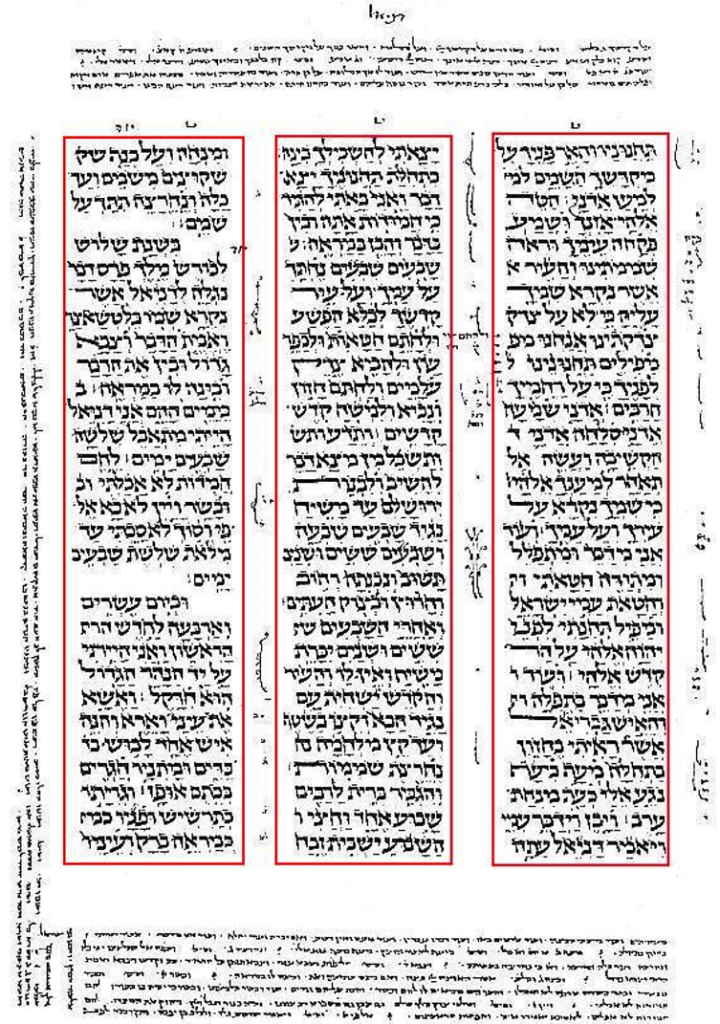How did the Scribes Alter Psalm 110?

It is not widely known, but the Scribes changed one word in Psalm 110. How do we know this? We know because the Scribes made a note in the margin of the change.
The picture below shows part of a manuscript of Scripture from the Old Testament. The text in the red boxes is the Bible text. This other text outside the red boxes contains information to help ensure the text is copied accurately. This other text is called the Massorah. The word Massorah comes from the Hebrew root masar, meaning to commit something into the trust of another.

The Massorah records the number of times different letters occur in the various books of the Bible; the number of words, and the middle word; the number of verses, and the middle verse; the number of expressions and combinations of words, etc. The purpose of all this is to safeguard the Holy Scripture and prevent the loss or misplacement of a single letter or word.
Before the Massorah was put in place the earlier scribes – known as Sopherim – made some small alterations to the text. Whenever they made an alteration, they wrote a note in the margin recording what they had changed. Later on, when the Massorah was added to preserve the text, they also kept a note of changes the Sopherim had made.
To summarise, the text outside the red boxes is called the Massorah. It contains:
- information to help ensure the text is copied accurately.
- notes on any alterations that were made to the text
Unfortunately, most translations of the Bible don’t note the alterations. However, there are some that do – such as Bullinger’s Companion Bible.
What are some of the changes that the Sopherim (the early scribes) made? The Sopherim changed the Hebrew word YHWH to Adonai in 134 places. The changes that the Sopherim made are listed in the Appendices of Bullinger’s Companion Bible.
What is the significance of changing the word YHWH to Adonai?
The Hebrew word YHWH means Eternal or Ever Living. It always refers to God. YHWH is translated in most Bibles as Jehovah or LORD (KJV).
The Hebrew word Adonai means Lord or master. It can refer to God or to a man. Adonai is translated in most Bibles as Lord.
Most of these changes where the Sopherim changed YHWH to Adonai are insignificant in that there is no loss of understanding. However, the change they made in Ps 110 is significant. It is significant because the way the text was originally written makes it very clear that there are two YHWHs – two God beings. And the way the text has been altered – which is the way it is translated in most Bible translations – it is now not clear at all.
The YHWH that the Sopherim changed to Adonai is found in verse 5.
Here are verses 1 and 5 as it is found in your Bible – as the Sopherim have changed it.
Psa 110:1 The LORD [YHWH] said to my Lord [Adonai], “Sit at My right hand, Till I make Your enemies Your footstool.”
Psa 110:5 The Lord [Adonai] is at Your right hand; He shall execute kings in the day of His wrath.
According to the Massorah (the marginal notes in the Bible Manuscripts), the Sopherim changed the original Hebrew text in verse 5. They changed the word YHWH to Adonai.
Here are the two verses again without the change.
Psa 110:1 The LORD [YHWH] said to my Lord [Adonai], “Sit at My right hand, Till I make Your enemies Your footstool.”
Psa 110:5 The LORD [YHWH] is at Your right hand; He shall execute kings in the day of His wrath.
Who is at the right hand of YHWH? YHWH! YHWH is at the right hand of YHWH. There as clear as daylight, these verses show that there are two YHWH’s – two God beings.